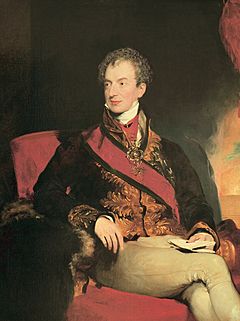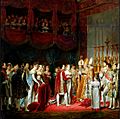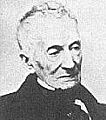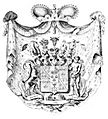Klemens Wenzel von Metternich facts for kids
Quick facts for kids
Klemens Wenzel von Metternich
|
|
|---|---|

Portrait of Prince Metternich by Lawrence
|
|
| Born | 15 May 1773 |
| Died | 11 June 1859 (aged 86) Vienna, Austria
|
| Nationality | Austrian |
| Education | University of Strasbourg |
| Known for | The Congress of Vienna, Minister of State, Conservatism, Concert of Europe |
| Spouse(s) | Baroness Antoinette Leykam (1827-1829), Countess Melanie Zichy-Ferraris (1831-1854) |
| Children | Richard, Fürst von Metternich |
| Parent(s) | Franz Georg Karl, Graf von Metternich-Winneburg and Countess Beatrix Kagenegg |
Klemens Wenzel Nepomuk Lothar, Prince of Metternich-Winneburg zu Beilstein (born May 15, 1773 – died June 11, 1859) was an important Austrian diplomat. He was a central figure in European politics for about 40 years. He served as Austria's foreign minister from 1809 and then as Chancellor from 1821. He had to resign during the Revolutions of 1848.
Contents
Who Was Metternich?
Early Life and Education
Klemens Metternich was born in 1773 into the House of Metternich, a noble family. His father was also a diplomat. Klemens received a good education, studying at the University of Strasbourg and the University of Mainz.
Rising in Diplomacy
Metternich quickly moved up in his diplomatic career. He served as an ambassador in different countries, including the Kingdom of Saxony and the Kingdom of Prussia. His most important early role was as ambassador to France, which was then led by Napoleon.
Dealing with Napoleon
One of Metternich's first big tasks as Foreign Minister was to improve relations with France. He helped arrange the marriage of Napoleon to the Austrian archduchess Marie Louise. This marriage was meant to bring peace between the two powerful nations.
Later, Metternich played a key role in Austria joining the War of the Sixth Coalition against Napoleon. He helped sign the Treaty of Fontainebleau, which sent Napoleon into exile. For his great service to Austria, he was given the title of Prince in 1813.
The Congress of Vienna
After Napoleon's defeat, Metternich led the Austrian team at the Congress of Vienna in 1815. This was a very important meeting where European leaders decided how to divide Europe after Napoleon's wars. Metternich worked hard to create a new balance of power in Europe. This meant making sure no single country became too strong.
Chancellor of State
Metternich became Chancellor of State in 1821 and held this position until 1848. He served under two emperors, Francis I and his son Ferdinand I. During this time, he worked to keep peace and order in Europe. This period is sometimes called the "Age of Metternich" because of his influence.
In 1848, there were many revolutions across Europe. These revolutions were often led by people who wanted more freedom and change. Metternich, who believed in traditional ways, was forced to resign and went into exile. He lived in London, Brighton, and Brussels for a few years.
He returned to Vienna in 1851. By then, a new emperor, Franz Josef, was in charge. Metternich offered advice but no longer held official power. He passed away in 1859 at the age of 86.
Metternich's Beliefs
Metternich was a traditional conservative. This means he believed in keeping things mostly as they were, with strong governments and traditional values. He wanted to maintain the balance of power in Europe. He was especially concerned about Russia becoming too powerful.
He did not like liberalism, which was a new idea at the time that supported more individual freedoms and changes in government. Metternich worked to prevent the breakup of the Austrian Empire. He used methods like censorship (controlling what people could read or say) and a network of spies to stop unrest.
Metternich's actions have been both praised and criticized. His supporters say he helped prevent major wars in Europe during his time. They also admired his skills as a diplomat, especially since Austria was not always the strongest country.
Images for kids
-
Karl von Schwarzenberg and the three allied monarchs after the Battle of Leipzig, 1813 (painting by Johann Peter Krafft)
-
Metternich alongside Wellington, Talleyrand and other European diplomats at the Congress of Vienna, 1815
See also
 In Spanish: Klemens von Metternich para niños
In Spanish: Klemens von Metternich para niños
 | Percy Lavon Julian |
 | Katherine Johnson |
 | George Washington Carver |
 | Annie Easley |










